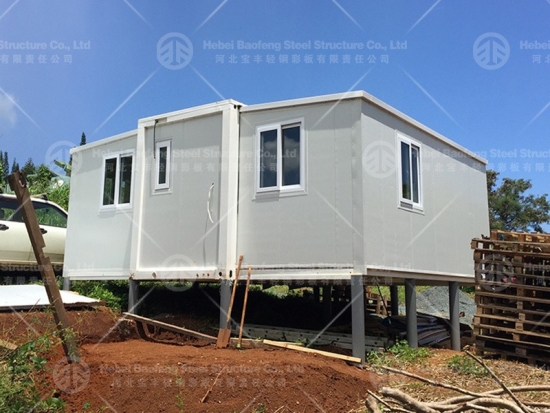Expanding housing exports to New Zealand
I. Background introduction
Our company was established in 2005 and focuses on the research, development, production and sales of steel structure buildings and modular houses. New Zealand has become the preferred target market for Company A due to its stable economic environment, high recognition of environmentally friendly buildings, and growing population and housing demand.
II. Market research and preliminary preparation
Before entering the New Zealand market, Company A conducted a detailed market research. They found that the New Zealand government has clear policy support for environmentally friendly and energy-saving buildings, and modular houses are in line with this trend due to their high efficiency, environmental protection and customizability. In addition, through communication with local builders and developers, our company learned that there is a strong demand for high-quality and fast-delivered housing in the market.
Based on this information, our company has developed a detailed market entry strategy, including:
1. Product customization: Improve and optimize existing products according to New Zealand's building standards and customer needs.
2. Partner selection: Find local strong builders and distributors, establish cooperative relationships, and jointly develop the market.
3. Brand promotion: Enhance brand awareness by participating in international building exhibitions and holding product launches.
3. Implementation phase
1. Product certification and compliance
Our company first ensures that its products comply with New Zealand's building regulations and safety standards. They invested a lot of resources in product improvement and passed the strict certification of the New Zealand Building Authority. Although this process is time-consuming and labor-intensive, it has laid a solid foundation for subsequent market promotion.
2. Establishing partnerships
By cooperating with well-known local builders, our company quickly gained a foothold in the New Zealand market. This cooperation model fully utilizes the advantages of both parties, achieves resource sharing and mutual benefit.
3. Brand promotion and marketing
Our company actively participates in architectural exhibitions in New Zealand and internationally to showcase the unique advantages of its products. At the same time, they also cooperate with local media to enhance brand awareness through news reports and advertising. In addition, our company also uses social media platforms to interact with potential customers and enhance brand influence.
4. Customer service and after-sales support
In order to win the trust of customers, our company has established a complete customer service system. They provide a full range of services from design consultation, product installation to after-sales maintenance to ensure that customers have no worries during use. This kind of caring service has won the reputation of customers and brought more repeat customers and recommended customers to the company.
IV. Achievements and Challenges
After several years of hard work, our company has achieved remarkable results in the New Zealand market. Their modular houses are favored by developers and consumers because of their high quality, environmental protection and fast delivery. The company's business volume has increased year by year, and its market share has continued to expand.
V. Future Outlook
Looking to the future, our company plans to further deepen cooperation with local companies in New Zealand, increase investment in research and development, and launch more innovative products that meet the needs of the local market. At the same time, they have also set their sights on Australia and other Asia-Pacific countries, hoping to further expand the international market through the successful experience of the New Zealand market.
VI. Conclusion
When expanding into the international market, companies need to conduct sufficient market research and preliminary preparations and formulate practical market entry strategies. At the same time, establishing partnerships with local companies and focusing on brand promotion and customer service are the keys to the successful development of companies in overseas markets. Through continuous learning and adjustment, companies can effectively respond to various challenges and achieve long-term development.


